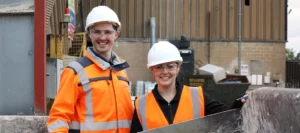Interview: Mark Jaccard – The Citizen’s Guide to Climate Success
 Mark Jaccard has been a professor for the School of Resource and Environmental Management at Simon Fraser University, Canada since 1986.
Mark Jaccard has been a professor for the School of Resource and Environmental Management at Simon Fraser University, Canada since 1986.
Jaccard has been involved in the International Panel on Climate Change (IPCC), the China Council for international cooperation on environment and from 1992 to 1997 he was the chair and CEO of the B.C Utilities Commission.
Most recently, Jaccard published his book, The Citizen Guide to Climate Success, the book outlines the steps that we should all take as citizens to save ourselves and the planet.
Environment Journal got in touch with Jaccard to chat more the arguments he lays out in his book.
You write: ‘Although we should encourage behavioural change, we must not delude ourselves that such efforts are effective.’ If this is the case, why should anyone be motivated to at all change their lifestyle?
The evidence is strong that we don’t need to change our lifestyle to address the climate threat.
We do need to change our behaviour as citizens.
Climate-concerned citizens must help get climate-sincere politicians elected so that they can implement carbon pricing and regulations that motivate everyone to change technologies and may motivate some to change behaviour.
I really like the emphasis on technological change over behavioural change and the fact that you emphasise that even vegetarianism is a technological change, can you talk more about this?
I am conflicted on this.
I can think of lots of good reasons for people to change behaviour.
I eat almost no meat, I travel to work by bike or bus (until I got an electric car) and have done this for over 30 years.
It was good for me and for the planet.
But humans love leisure, entertainment, novelty, status and most of these things lead to more consumption, more material and more energy use.
And people in the developing world, with rising incomes, will demand more of these human attractions and necessities.
So behavioural change goes both ways.
Thus, we must have technological change if we are to decarbonize, and while this is obvious with the need for biofuel or hydrogen or even battery-electric aeroplanes, it may even happen in daily life consumption.
It is in that sense that I noted that even the new meat substitute products can be seen as technological change.
And I guess my point is that I don’t care which way it happens.
I am leery of people thinking that government can somehow engineer people’s behaviour.
You write: ‘If we say that consumer change is essential then we let politicians off the hook, enabling them to claim that they’re waiting for this change.’ Do you think this is what is happening now in countries like the UK and Canada, is the focus too much on the individual rather than the whole country?
I would say that this was definitely the case in the 90s and 2000s in most developed countries.
But it is changing – thank heavens!
In the UK and Canada, and many other jurisdictions, the climate sincere politicians now talk about the need for carbon pricing and/or regulations and when they get elected they implement some mix of these.
It is not yet stringent enough. But at least the right policies are being implemented – that being compulsory ones that do not rely on waiting for mass voluntary behavioural change.
In the UK the airline EasyJet said they are carbon-neutral because they offset the emissions from all their flights. What are the dangers of offsetting spreading not just consumers but to major companies?
As with other issues in the book, I don’t believe that we can convince offsetters that they are not very effective.
The key is to make sure that our carbon pricing or regulatory policies do not have ‘large’ offset loopholes.
Keep them as small loopholes if we must have them!
You state that the most important sectors to decarbonise are electricity and transport, in this case, are you optimistic, as we are seeing lots of innovation in this area?
I’m not sure about optimistic.
My book tells people what they need to do to get a certain outcome.
If you now ask me a predictive question, like do I think humanity will start moving quickly in sectors like transportation, I think there is a huge struggle to come, especially in the developing world where all the oil use and emissions are increasingly happening.
But rich countries moving quickly will make it easier for developing countries to do the same.
This is why the UK and Canada should match Norway’s goal of having no pure gasoline vehicle sales by 2025.
This is feasible. Some auto companies will lose money. But they have caused us to stall for long enough.
You talk about the problem with global pledges to reduce emissions, why do you think these have not worked?
I think that our global governance institutions and diplomatic abilities are weak.
Rich countries and poor countries are miles apart in terms of how much financial help will be forthcoming.
Given these conditions, it is delusional to think that an effective, binding global agreement, with meaningful penalties for non-compliance, will be negotiated voluntarily and universally.
For 25 years, the Conference of the Parties negotiations has been held under this false premise.
Where does that leave us?
Climate leading countries need to do more than just reduce their domestic emissions.
They need to start threatening carbon tariffs on imports from laggard countries, including the US.
If one large country does this, like the US or China, others will fall into line.
If medium-size countries do this, like Canada and the UK, they need to keep encouraging others to join them in what experts are calling ‘climate clubs.’
Your overwhelming message in the book is that we need to put pressure on politicians and a few key sectors of our economies. What is the best way to do this?
Climate-concerned citizens need to be active in terms of politics and civil society actions, but these efforts must be very focused.
For example, the demand is that our politicians phase-out coal plants.
The UK and Canada have had climate-sincere politicians doing just this very thing. Now those same politicians must work to make it a global movement.
The UK and Canada started a Power Past Coal Coalition. This is good. But eventually, that coalition needs to be putting tariffs on goods from countries that are not in the process of closing their coal plants.
Then, a similar process must be happening with phasing out of fossil fuel-derived gasoline and diesel in the transportation sector.
First a domestic effort, then matched quite quickly with a global effort, using tariffs if needed.
It is not that I am in love with this path. It is just that the alternatives people have suggested seem delusional to me and my reading of the evidence.

The Citizen’s Guide to Climate Success is available online for free here and is available to order in print here.
Photo Credit – Mark Jaccard















